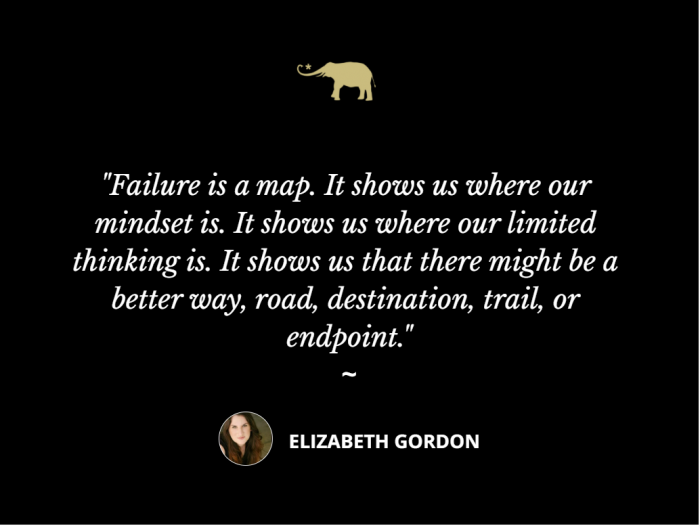View this post on Instagram
Failure is a concept that has gotten seriously out of control.
This seven-letter word literally controls people’s lives, choices, thoughts, and sense of self. We have become so afraid of it, it’s like the adult version of the monster living under the bed.
Maybe if we close our eyes, it will just go away.
For us to feel better, we must unpack our beliefs and points of view around these big, scary, and weighted words.
Why are we so afraid of failure?
Because we have attached the concept to our worth as human beings. We’ve made an internal checklist of what is acceptable and what isn’t. And since we’ve decided that failure is never acceptable, we unconsciously lower our worth, chastise our efforts, and allow shame to meander in when it happens to us.
But we don’t have to be at the mercy of our conditioning around this concept. We can change our minds and expand our thinking. We can choose something else when failure comes knocking at the door. We can put the “do not disturb” sign out and order some room service.
First, let’s define it. What is failure, really?
A few Google searches show definitions of failure as “lack of success,” but at its essence, failure is a judgment that something you set out to do turned out differently than your expectations. That’s it.
Something went differently than you’d hoped it would. It didn’t follow the plan you created in your mind. It deviated from how you envisioned it.
This doesn’t make the outcome “bad” or “wrong”; it makes the outcome different, which are individual vibrations.
Our perception of the outcome is everything. We decide how we will experience it.
“Success” is also defined by us and our personal preferences, boundaries, beliefs, and how much we allow ourselves to have and achieve.
Does it feel crappy when things don’t go the way we wanted? Absolutely.
Are we allowed to feel yucky, annoyed, and downright angry? Yes.
Does resisting the aftermath of failure feel almost as bad as the failure itself? Most definitely.
But I have good news: you have more control over how you feel than you realize. You can take a step back and honor what happened and still find some gems in there.
The only thing that makes failure such a bad word is our perception of it.
If I had an expectation to start a successful bakery (whatever that means) and two years in I have to close my doors (possibly due to circumstances beyond my personal control), I can look at this in two ways:
1. “I succeeded in running a bakery for two years, learned a ton about opening and running a business, met great people who gave me their money for my creations, provided joy to families for their special occasions, created jobs, paid taxes to my local community for the good of everyone, built my confidence as a business owner, supported other business owners by paying rent, utilities, buying supplies, and advertising, and up-leveling my communication skills. All these skills are transferable to anything else I may want to pursue. I am rich with knowledge and experience.”
2. “My bakery didn’t last for 50 years. I suck and should just give up on life altogether. I always knew I was a loser and this proves it.”
Most of us might choose #2 because of our conditioning, which has taught us to steer so clear from failure, we can hardly utter the word without feeling nauseous, shameful, and downright wretched.
For me, it would be a “failure” to not see/take note of those things that did get created, tried, or achieved. It may look different, but it doesn’t mean there isn’t value.
Failure is tricky because it seems so dire, so important, so necessary to acknowledge.
But failure is not dire in and of itself—our perception of it is, and we get to choose our perception.
As I said above, this isn’t about ignoring your feelings when something turns out differently from our desired outcome. The ego and psyche need time to process. It’s okay to sit on the couch while eating raw cookie dough and crying till our eyes are swollen shut. You’re human and it’s okay to be human.
What matters is the choice we make after the perceived failure.
Where can we go from here?
What did we learn?
Was this really as bad as we are making it out to be?
What are the silver linings, even if they are teeny tiny?
I have heard hundreds of stories from friends, clients, and random strangers about the power they felt after a so-called “failure.” Not getting what they wanted pushed them toward something more resonant, more in alignment, and more joyful.
Another reason failure can feel so heavy is our deep desire for permanence.
We love the idea of the 60-year marriage, the business that is still standing after 100 years, and the family-owned store down the street that has been there since we were kids. The notion of a long-lasting thing makes us feel better because we can rely on it. With so much change, having something that we can always fall back on feels like safety.
But longevity does not necessarily equal contentment, peace, or joy. That 60-year marriage might be extremely unhappy, and that 100-year old business may not be doing so well financially.
Failure is a map. It shows us where our mindset is. It shows us where our limited thinking is. It shows us that there might be a better way, road, destination, trail, or endpoint.
Because failure is a man-made concept, and for a long time, it’s worked exactly how it was designed: to rob you of confidence, creativity, and moving ahead.
We have more power than we realize. We have more control than we realize. We have more choices than we realize.
Maybe something in your life feels like a failure right now, something that didn’t go according to the plan you set.
The question going forward is: how can this work for me the way it is now?
If we can’t change an outcome, we must change our thinking. It’s the one weapon we have to disarm our conditioning and social programming and wake us up from the stupor of a limited point of view.
Reclaim and reframe failure for yourself. Walk that dark road and watch it light up as you surrender what didn’t work or manifest and ask what can be created now.
The scariest thing about failure is not that it happens—it’s that we allow it to deter us from moving ahead and moving on.












Read 18 comments and reply